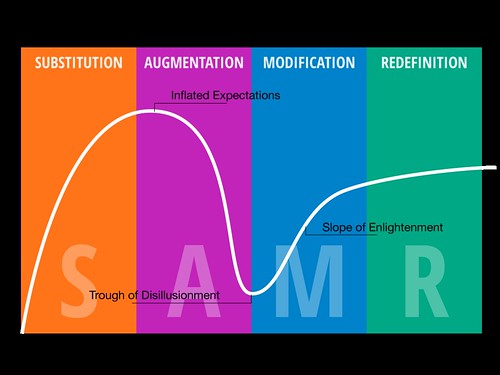
My dean directed me toward an opinion article in the prestigious New York Times by
Susan Pinker. The title was
"can students have too much tech?" Who can resist this title? Of course you can have too much tech- thinks the person reading this on her iPad seating at Starbucks on a staurday morning. Kids these days all they do is play video games and waste their time texting.
A closer read of the article actually disproves the main thesis quite clearly. I expect more from a published author and a psychologist by training! I almost never comment on writing like this. In this case, however, I am mostly because we all expect better from a publication like the New York Times.
I would like to say that I agree with some of the premises in the article namely:
1. It sucks to be poor. Children raised in poverty have lower outcomes on standardized tests.
2. Devices are no magic. It depends what you do with them. Duh.
3. We still need teachers to teach even if we have devices.
4. Putting crappy devices in students hands without support will do very little to improve academic outcomes (
sorry Sugata Mitra I am not a believer).
While we definitely need to be careful about technology use and balance in this just like any other facet of our lives a careful of the article and the sources cited bring a totally different picture.
Here is what is inflammatory, cherry picked, and untrue:
The story starts with the Obama initiatives on free and open Internet and providing access. Both policies are crucial for long term success of our educational system and social justice but are also completely unrelated to the evidence cited later. The critique is mostly about tech use at home
(where they gathered some correlational data) but the implication is that the president¹s agenda in this area is wrong.
1. There is no consideration that technology is an area of literacy that is just as important than any other. Without computer/Internet literacy students are behind (if you can't conduct an excellent Internet search for research- how good is your research paper going to be?).
2. They basically point to an interaction between poverty and home access to technology. Does that mean that all kids are better off without access at school or even at home? Is she advocating letting middle class students have access at home but not for African American boys? Really?
3. The data is old and it predates smart phones, high speed internet, and the wide array of educational resources avaialbale and required in education (for example GAFE). Smart phones are now ubiquitous and most students from mid school up have them- including children growing up in poverty. That means that access is already there all that is left to schools and parents and to try and channel the activity to educational benefit as well as social and entertainment.
4. Now for the main source of data. The report is from 2010 the data is from 2000-2005 (what tech did we have then?). The report is by two economists. They actually claim: (1) that students that always had a computer actually improve over time (2) some students do better after they get a computer and finally and
5. Most importantly their effect sizes are all in single digit % effect size that is for them an effect size of .02 standard deviation is fairly large. In educational research any effect smaller than .40 (that is 20 times higher than that reported). This effects are considered small and not educationally meaningful.
The clearest part of this is that the author has failed at critical reading and thinking. She does not (want to?) understand that the devil in any report is in the details and in complete reporting including the context of a decade old study. It is legitimate to have concerns, it is also legitimate to question the ways technology can be used. Support for the argument should be based on a reasoned argument, and facts that are relevant to our current context.
 This of course is not accidental. I have been observing in schools and at home the impact of games like Minecraft and Little Big Planet. For adults they are games, but I argue that for kids they create new ways of thinking. As a result generation D maybe growing up the most creative one yet, a generation that has a creative instinct. A generation that idenftifies a problem and doesn't just want to solve it, they want to re-engineer it. The question for us is how do we design schools that cultivate and support this world view?
This of course is not accidental. I have been observing in schools and at home the impact of games like Minecraft and Little Big Planet. For adults they are games, but I argue that for kids they create new ways of thinking. As a result generation D maybe growing up the most creative one yet, a generation that has a creative instinct. A generation that idenftifies a problem and doesn't just want to solve it, they want to re-engineer it. The question for us is how do we design schools that cultivate and support this world view?




.jpg)
